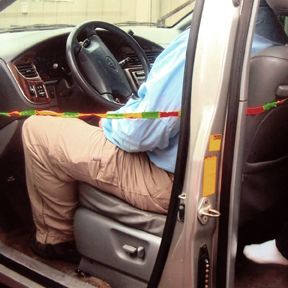
It’s a heartbreaking problem with no immediately clear solution: Each year, dozens of babies die of heatstroke after their parents accidentally leave them in the backseat of the car. Sixteen kids have already died this way, according to one organization that tracks such deaths, and it isn’t just a problem in especially hot regions. Even on a mild day in the low 70s, a car sitting in the sun can warm up to 100 degrees in less than an hour.
Advice to parents usually boils down to something like Seriously, just remember, okay? But a kid in Nashville might have invented a smarter solution, as the science site Eureka! Lab reports today: a rubber-band-duct-tape contraption that traps you in your car, which, 12-year-old Andrew Pelham argues, will force you to look in the backseat in order to exit the vehicle. The middle-schooler has a website with instructions on how to make the device, though the Eureka! Lab writer points out that a simple bungee cord could work just as well.
The thing will only work if parents remember to use it, which means storing it somewhere conspicuous like the front seat. But overall, the device does tap into some behavioral truths, because experts who study these tragedies say you can’t simply will yourself into remembering something. The idea that a person really could forget their own child sounds improbable, but researchers say that the slightest change in routine can trip up your lizard-brain’s memory. Gene Weingarten explored the psychology behind these hot-car deaths in a heart-wrenching 2009 Washington Post story, in which he spoke to molecular physiologist David Diamond:
Diamond says that in situations involving familiar, routine motor skills, the human animal presses the basal ganglia into service as a sort of auxiliary autopilot. When our prefrontal cortex and hippocampus are planning our day on the way to work, the ignorant but efficient basal ganglia is operating the car; that’s why you’ll sometimes find yourself having driven from point A to point B without a clear recollection of the route you took, the turns you made or the scenery you saw.
Ordinarily, says Diamond, this delegation of duty “works beautifully, like a symphony. But sometimes, it turns into the ‘1812 Overture.’ The cannons take over and overwhelm.”
By experimentally exposing rats to the presence of cats, and then recording electrochemical changes in the rodents’ brains, Diamond has found that stress — either sudden or chronic — can weaken the brain’s higher-functioning centers, making them more susceptible to bullying from the basal ganglia. He’s seen the same sort of thing play out in cases he’s followed involving infant deaths in cars.
Sometimes, especially during a stressful day or even a morning where something’s just a little bit off, trusting your own memory simply isn’t enough.




